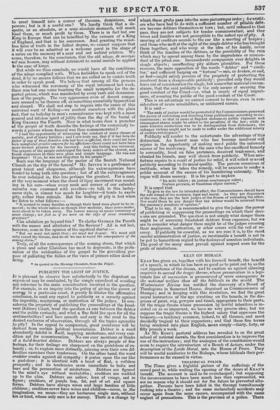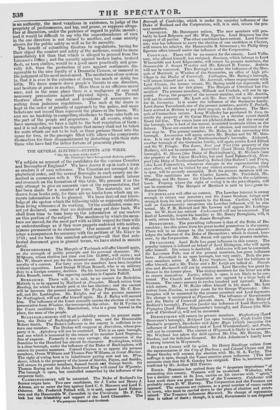KEAN ON MORALS.
KEAN has given us, together with his farewell benefit, the benefit of a speech, in which he has been so good as to point out to us the vast importance of the drama, and to caution us against allowing enzpirics to ascend the tragic throne, whose preservation in a legi- timate line of succession is pronounced of more consequence to the national welfare than all the biblicals in the world. The Westminster Review has notified the discovery of a Board of Theologians in Somerset House, disguised as Commissioners of Stamps ; and in keeping with this revelation, we find the great moral instructors of the age strutting on the boards, in the dis- guises of paint, wig, gewgaw and tinsel, appropriate to their parts. Of the tragic throne whose possession by lawful inheritors is in- sisted on as so important, we have no very precise idea; but we suppose the tragic throne is the highest salary that oppresses the treasury,—a tendency common, indeed, to all thrones, and most decidedly tragical to their supporters; and that these fine terms being rendered into plain English, mean simply—thirty, forty, or fifty pounds a week. As Mr. Kean's pastoral address has revealed to us the great school of national morals, the first consideration is to improve the use of the instructors ; and the analogies of the constitution would seem to require the introduction of a Bench of Actors, under the description of the Lords. Moral, into the House of Peers. They will be useful auxiliaries to the Bishops, whose biblicals their per- formances so far exceed in virtue.
THEATRICAL POLICE.
The Times gives a frightful picture of the sufferings of the crowd pent in, while waiting the opening of the doors at KEAN'S benefit. The account is said to be overcharged ; but supposing the inconvenience to have been much less than represented, we see no reason why it should not for the future be prevented alto- ether. Persons have been killed in the throngs tumultuously rushing into a theatre ; and the same melancholy accidents may occur again from the same causes, accompanied with the same neglect of precautions. This is the province of a police. There is an authority, the most vexatious in existence, to judge of. the propriety of performances, and lop, and prune, or suppress altoge- - ther at discretion, under the pretence of regard to public morals ; and it wouldhe difficult to say why the superabundance of care in the one direction is not turned to another, and some anxiety shown for the public safety as well as for its morality. The benefit of submitting theatres to regulations, having for their object the comfort and safety of the audience, would be more immediately felt than that which is alleged to proceed from the Licenser's Office ; and the security against broken limbs, bruised flesh, or torn clothes, would be a good more practically and gene- rally felt, than the protection of ears against sentiments dis- agreeable to the nice loyalty of a Dramatic Censor, or immoral in the judgment of his most moral mind. The misfortune of our system is, that it is ever in the extremes of doing too much or doing too little. We force camels down people's throats in one direction, and hesitate at gnats in another. Here there is an officious moral care, and in the same place there is a negligence of easy and necessary precautions against physical injury. The French theatres show the comfort and avoidance of annoyance re- sulting from judicious regulations. The mob at the doors is kept in the order of priority of approach by the police, and more tickets are not issued than represent the places in the house. We can see no hardship in compelling obedience to these rules both on the part 'of the people and proprietors. At all events, while we have monopolies, we have a right to the best regulation of them ; and it is not asking much to require that money shall not be taken for seats which are not to be had, or three persons thrust into the space for two, or the passages filled with idlers who compensate themselves for their disappointment by disturbing with their riots those who have had the better fortune of procuring places.



























 Previous page
Previous page